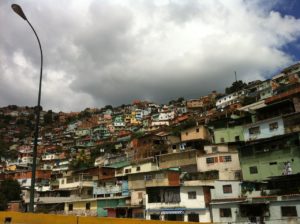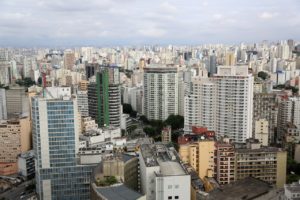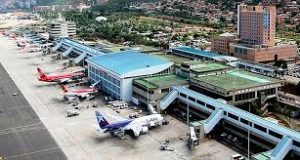by Gerald L. DeSalvo
A significant number of U.S. multinational corporations have closed or greatly reduced their operations in Venezuela over the past several years, due to the deteriorating political, security and economic situation. Some enterprises are still operating, albeit, with reduced activity and under very difficult circumstances. This article is intended for those business travelers required to visit Venezuela. It will discuss the crime threat they will face in the country and how they might somewhat reduce their vulnerability in this highly dangerous and volatile environment.
circumstances. This article is intended for those business travelers required to visit Venezuela. It will discuss the crime threat they will face in the country and how they might somewhat reduce their vulnerability in this highly dangerous and volatile environment.
How Bad Is the Security and Crime Situation in Venezuela?
Most business travelers to Latin America are aware of the alarming rates of violent crime in a number of the countries in the region. In the majority of the countries with high crime rates, a visitor who follows common sense security precautions can greatly reduce their chances of becoming a victim of a serious crime. The security situation in Venezuela, however, poses a much more serious challenge to the personal wellbeing of business travelers than any of the other high-risk Latin American countries. Why is travel to Venezuela so dangerous? A variety of factors contribute to its critical crime threat. InSight Crime, in its excellent 2018 study of Venezuela, points out that the country is virtually a state controlled by criminals, both in and outside of its government institutions.
It lists 7 reasons for classifying the country as a “Mafia State”: (1) Top level criminal penetration into state institutions (including the president’s office, armed forces, intelligence services, police and criminal justice system), (2) Evidence of kleptocracy (pervasive use of public institutions for personal gain), (3) The devolution of state powers to irregular and illegal actors (large, usually armed civilian groups “colectivos” that control neighborhoods with the government’s tacit approval and “pranes” (incarcerated criminal group leaders who are allowed to control entire prisons and to control their groups illegal activities outside the prison, all tolerated by the government), (4) Exponential growth of Venezuelan organized crime (with the assistance of new laws such as “Peace Zones” where control of these zones was effectively turned over to very large violent gangs (megabandas) and where police and security forces are restricted from entering), (5) High levels of violence by state and non-state actors (Venezuela is considered the most dangerous country in Latin America by many experts, and Caracas, one of the most dangerous cities in the world. Also disturbing, is the very high number of killings by police and security forces), (6) The Exportation of Criminality (the country now serves as a drug transit hub for narcotics, a safe haven for criminals from surrounding countries, a leader in sex-trafficking in nearby Latin American countries, and a regional center for international money laundering) and, (7) Widespread international accusations of criminal behavior (numerous countries, the European Union and the United Nations have accused the Venezuelan government of involvement in and/or support of a variety of criminal enterprises). (InSight Crime, 2018).
Venezuelan organized crime (with the assistance of new laws such as “Peace Zones” where control of these zones was effectively turned over to very large violent gangs (megabandas) and where police and security forces are restricted from entering), (5) High levels of violence by state and non-state actors (Venezuela is considered the most dangerous country in Latin America by many experts, and Caracas, one of the most dangerous cities in the world. Also disturbing, is the very high number of killings by police and security forces), (6) The Exportation of Criminality (the country now serves as a drug transit hub for narcotics, a safe haven for criminals from surrounding countries, a leader in sex-trafficking in nearby Latin American countries, and a regional center for international money laundering) and, (7) Widespread international accusations of criminal behavior (numerous countries, the European Union and the United Nations have accused the Venezuelan government of involvement in and/or support of a variety of criminal enterprises). (InSight Crime, 2018).
How do the United Kingdom and United States view the crime situation in Venezuela?
The United Kingdom, Foreign and Commonwealth Office (UK/FCO) provides the following advice on travel to Venezuela.
The UK/FCO advises against all but essential travel to Venezuela as, “…there is a high threat from violent crime and kidnapping throughout Venezuela, which has one of the highest murder rates in the world. Armed robbery, mugging, carjacking, and burglary are all common and are often accompanied by violence. These crimes can occur at any time and in a wide range of places. This includes on the street or the beach, in supermarket queues or when travelling in private vehicles or public transport, or indoors”.
The U.S. Department of State Travel Advisory for Venezuela (as of May 2018) is: Level 3: Reconsider Travel. Some of the reasons for its very severe warning are: extremely “high rates of violent crime, civil unrest, poor health infrastructure, and arbitrary arrest and detention of U.S. citizens”. It recommends that U.S. citizens not travel: “…on roads after dark outside of Caracas due to crime, …and to certain neighborhoods within Caracas due to crime. It adds that violent crime such as homicide, armed robbery, kidnapping and carjacking are common…and that political rallies and demonstrations occur, often with little notice”. It warns that these demonstrations frequently lead to violent clashes between the security forces and demonstrators which can affect innocent bystanders.
Both the UK/FCO and U.S. State Department advise against all travel to within 80km (50 Miles) of the Colombian border due to a lack of effective police and security force coverage, very high rates of homicide, armed robbery, kidnapping, organized drug trafficking and the presence of numerous illegal armed groups.
The UK/FCO, further advises to specifically avoid travel within 50 miles of the Colombian border in the states of Zulia, Tachira, Barinas, Apure and Bolivar, within 50 miles of the Colombian border in Amazonas state as far south as 62 miles south of Puerto Ayacucho, and within 25 miles of the rest of the Colombian border with Venezuela.
The Security Threat in Caracas
As a guide for U.S. visitors the U.S. Embassy in Caracas advises, via the State Department Travel Advisory, that it prohibits its U.S. personnel from traveling in the following Caracas neighborhoods on personnel business due to the critical crime threat:
“Western Libertador (Coche, El Valle, El Retiro, 23 de Enero, Blandin, La Vega, La Rinconada, Las Mayas, Tazón, Oropeza Castillo, Lomas de Urdaneta, Propatria, Casalta, Lomas De Propatria, Carapita, Antímano, Tacagua, Ruíz Pineda, Caricuao, La Quebradita, El Atlántico, Sarría, San Martín and La Yaguara).”
“Eastern Sucre (Barrio Píritu, Barrio La Rubia, Barrio Altavista, Petare, Caucaguita, La Dolorita, Paulo Sexto, El Llanito)”
“Specific neighborhoods in Baruta (Las Minas, Santa Cruz del Este, Ojo de Agua, La Naya, Las Minitas).”
It also prohibits U.S. personnel to, “… travel outside of the Embassy’s housing area between the hours of 9:00 p.m. and 2:00 a.m. in a single, unarmored car”. Additionally, “… all U.S. personnel are required to be out of public venues and physically located within the Embassy’s housing area or another specified secure location from 2:00 a.m. until 6:00 a.m.”. (Note: These U.S. Embassy security restrictions (including a curfew) are indication of the seriousness of the crime threat in Caracas).
The UK/FCO advises that, …”Sabana Grande is not a safe area… and recommends its citizens to “avoid… ‘barrios’ (heavily populated slums), as these are unsafe and to avoid queues for supermarkets, pharmacies and other shops as they can turn violent”. It also advises, extreme caution in the Avila National Park due to the frequency of armed robberies.
Special Security Risk: Travel to and from the Maiquetia Airport (Caracas)
Both the UK/FCO and U.S. State Department warn visitors to be especially careful when traveling to and from the Maiquetia Airport in Caracas due to the high level of criminal activity on the road, much of which is directed at arriving/departing passengers, airport visitors, and workers, by organized groups of criminals. They both also recommend not to travel on the road to/from the airport during the hours of darkness and especially along Avenida Libertador in Caracas, where there are numerous reports of armed robberies of vehicles and buses to and from the airport.
groups of criminals. They both also recommend not to travel on the road to/from the airport during the hours of darkness and especially along Avenida Libertador in Caracas, where there are numerous reports of armed robberies of vehicles and buses to and from the airport.
The UK/FCO also mentions that criminal groups also target possible wealthy passengers using “spotters”, inside the airport, and then notify their accomplices outside. The targeted passengers have been robbed in airport parking lots and/or have been tricked into using “bogus” airport taxis and then been robbed. Victims have also been followed on the road from the airport and robbed, or followed and robbed when they arrived home.
COMMENT: As one can see the risk from violent crime in Venezuela is at critical levels. This risk, combined with the criminal activity engaged in by many government and public security organizations, high levels of organized crime, large and powerful gangs, poor police service, medical rescue and emergency care, and frequent public disorder and demonstrations, all create a very dangerous situation for business travelers who, in an emergency, might find themselves “on their own” when seeking help. For this combination of reasons travelers should reconsider travel to the country.
12 Common Sense Security Precautions for Business Travelers to Venezuela
Travel to Venezuela is very dangerous according to the governments of the United Kingdom and the United States due to numerous security and other risks. If travel is unavoidable, these risks can be somewhat reduced, however, by following good security precautions/awareness. The list of 12 Common Sense Security Precautions for Business Travelers to Venezuela, provided below, includes precautions that are practical and should help you reduce your chance of being victimized.
- The first recommendation is to avoid business travel to Venezuela, if possible, due to the pervasive rate of violent crime, lack of adequate medical services and public disorder throughout the country. The UK/FCO recommends, “…all but essential travel” to the country and U.S. State Department recommends, “…reconsider travel”. Both recommend against any travel within 50 miles of the border with Colombia. Business travelers should consider conducting required Venezuela business via teleconference, scheduling meetings in a nearby country, and/or minimizing their time in country to a minimum, whenever possible.
- U.S. citizens should register with the U.S. State Department’s, Smart Traveler Enrollment Program (STEP) before they leave for Venezuela. Program registration is available online. Check the State Department’s public version of the OSAC Crime and Safety Report, its Travel Advisory, and High Risk travel guidance for Venezuela and follow the guidance contained in them.
- If you have an organization sponsored Travel Safety Program, follow its travel guidance and procedures. If your local office has a security package for visitors (e.g., security escorts, security driver/special vehicle) follow their advice. Make sure to keep your local office apprised of your whereabouts and planed activities when outside of your hotel.
- Plan to arrive at the Caracas airport during daylight hours. Try to arrive in Venezuela as close to mid-day as possible in case of possible flight arrival delays. You do not want to travel on the airport road during hours of darkness. Plan your departure flight time from Venezuela late enough to permit you to take the airport road during daylight hours. You do not want to be driving in the dark to the airport at 4 a.m., for example, to catch a 6:30 a.m. flight. Use a hotel vehicle or office provided vehicle and driver for transportation to and from the airport, whenever possible.
- Always maintain good situational awareness when in Venezuela and especially when on the street. Look for suspicious persons and vehicles when you are out. Avoid them and put distance between yourself and them as quickly as possible. Get to a nearby safe haven such as a police or fire station, hospital, open government building, or busy business location and call for help, if necessary.
- Keep a low profile and avoid ostentatious displays of wealth at all times. Do not bring or wear expensive jewelry, watches, or display large sums of cash when in Venezuela. Be discreet. Try not to attract attention to yourself.
- Do not leave valuables such as cell phones, purses, cameras, and laptops, unattended in hotel lobbies, restaurants, vehicles, nightclubs, or at the beach.
- When you arrive in Venezuela ask your local coworkers and/or hotel concierge what high crime areas to avoid in the cities/areas where you are visiting. Avoid marginal communities (barrios) where violent crime is high, rural or isolated areas where there is little police presence, and areas of a city where street prostitution and drug sales are highly visible.
- Avoid adult entertainment establishments such as strip clubs, massage parlors, and bordellos. These are typically run by organized crime members and patrons are routinely overcharged, robbed, drugged and assaulted in these locations.
- Avoid dark, poorly lit, desolate and isolated areas at night. Follow the U.S. Embassy guidance for its employees and be off the street and at your hotel (preferably a major multinational hotel located in a safer area of the city and with good security) between the hours of 9 p.m. to 6 a.m. Once again, ask local coworkers about areas of the city/country you should avoid or be especially cautious.
- Avoid using public buses and “gypsy” or unmarked taxis. Only use your business provided vehicle and driver, registered taxis or hotel vehicles, if possible. Ask your local coworkers and hotel how to arrange for these services.
- When riding in vehicles in Venezuela, lock all doors and keep all windows closed to avoid being victimized by petty street criminals, who often congregate at busy intersections, especially during “rush hour”.
Conclusion
This article examined the serious crime situation in Venezuela and areas of special risk and concern. It provided links to UK/FCO and U.S. State Department provided resources on the security situation in Venezuela and their suggested guidance for their citizens. The article discussed 12 common sense security precautions that business travelers should follow when in Venezuela that could, somewhat, reduce their chances of being victimized while in the country. The clear message of the article is that business travel to Venezuela is a clear case of, “Discretion is the Better Part of Valor” and should only be undertaken when absolutely necessary.
Author: Gerald L. DeSalvo is the Managing Editor of WGSG. He has more than 38 years of experience in military intelligence, municipal policing, federal law enforcement and international security management He has lived and worked for over 15 years in Latin America, Asia and Southern Europe.
Copyright (c) 2018. All rights reserved.
Disclaimer: The Wellington Global Security Group is not responsible for any errors or omissions, or for the results obtained from the use of information contained in this website. All information in this site is provided “as is”, with no guarantee of completeness, accuracy, timeliness or of the results obtained from the use of this information. Any action you take based on the contents of this website is strictly “at your own risk”.

